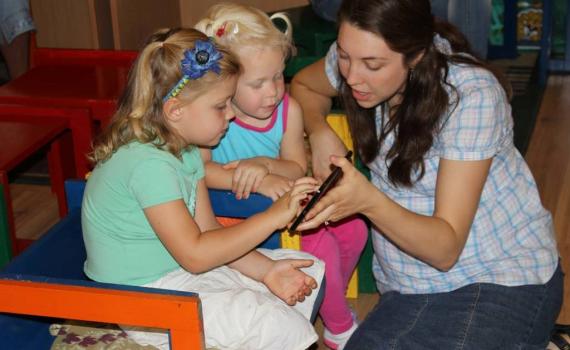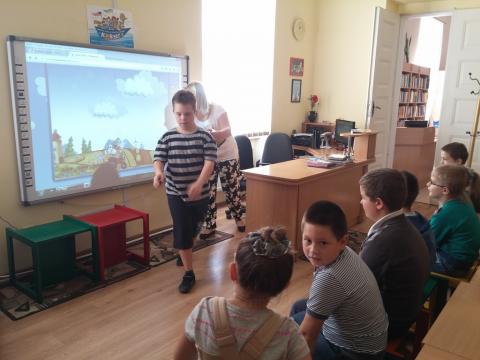
Lviv Regional Children’s Library’s literacy service - titled ‘Literandiya’ - uses an interactive computer game to teach children and adults how to read and write using the Ukrainian alphabet.
‘Literlandiya’ serves a critical need. “Our town, Lviv, has just 94 kindergartens, accommodating only 5,000 children, and there is a long waiting list of about 16,000 children trying to get into kindergartens” said Larisa Lugovaya, head of the library.
“Our new service offers an alternative for these children. By introducing them to the symbols of the alphabet, and helping them to understand the relationship between writing and words, we are helping to prepare them for the day they must start school,” she said.
The Ukrainian alphabet classes became so popular that the library decided to include classes for students from a nearby boarding school attended by children who have difficulties learning language, and to internally displaced people who have fled from violence in Eastern Ukraine, where Russian is the main language, and whose knowledge of the Ukrainian alphabet is poor.
The main teaching tool in the ‘Literlandiya’ classes is a free educational game, titled ‘Mishenyatkova ABC’ (‘Mouse’ ABC). The programme - the first software for teaching the Ukrainian alphabet - was developed by the technology company, Impulse Ltd., which is one of the library’s partners. The game can be played on computers, tablet computers and smart phones.
Teaching is conducted by librarians, who are supported by a psychologist. The psychologist plays an important role in classes for the boarding school children who have learning difficulties and in working with children of internally displaced families, who may have suffered trauma as a result of violence.
CHILDREN LOVE THE LIBRARY’S CLASSES
Since the launch of their Ukrainian-language literacy programme in September 2015, the library has worked with over 200 learners.
To ensure their classes are varied and lively, the library draws on many online resources. Games and competitions are integrated into classes, and teachers and students make good use of the library’s interactive whiteboard.
Tatiana Zelenska, a native Russian speaker, recently moved to Lviv with her six-year-old son, Sasha: "My son really likes the classes. For children learning is not always joyful. Now, in addition to coming to the library and learning the letters and words in an interesting way, Sasha also has the opportunity to meet children and make new friends. He likes the attitude of the teacher-psychologist and the librarians, and he tries so hard to speak Ukrainian. For me as for a mom, the very important thing is the psychological situation around my son, because his success depends on this,” said Tatiana.
“Our children struggle to learn, but the lessons in the library are always very interesting for them,” said Victoria Hlovyak, a speech therapist from the boarding school. “Since they have begun attending alphabet lessons, the children are more attentive and focused, because each of them wants a turn to go to the interactive whiteboard,” she added.
THE LIBRARY’S SERVICE EXPANDS… AND EXPANDS
Encouraged by the success of their Ukrainian alphabet classes, the library is now also teaching kindergarten teachers and students from Lviv Institute of Postgraduate Education to use ‘Mishenyatkova ABC’ and other digital teaching aids.
The service is also expanding to include different languages. The library has already enrolled learners who want to learn English, and a group of volunteer student teachers have begun using the same computer game, which is available in several languages, and other resources to teach the Roman alphabet.
News about the service spread across Ukraine’s borders, into neighbouring Poland. After attending a master class at Lviv Regional Children’s Library, a Ukrainian language teacher and member of the Association of Ukrainians in Poland has begun teaching the Ukrainian alphabet to Ukrainians living in Poland. As a partner of Lviv Regional Children’s Library, the association has free access to ‘Mishenyatkova ABC’.
Read about more innovative public library services contributing to education of children and adults. PLIP-EDUCATION





